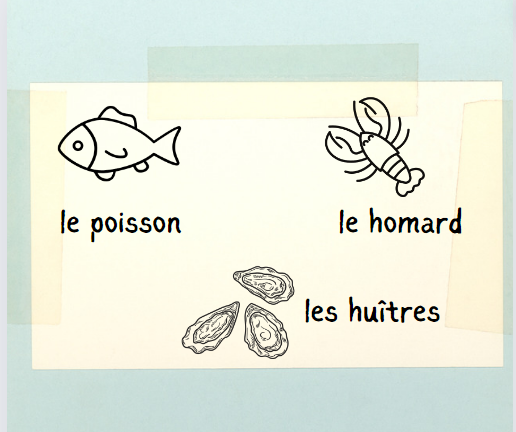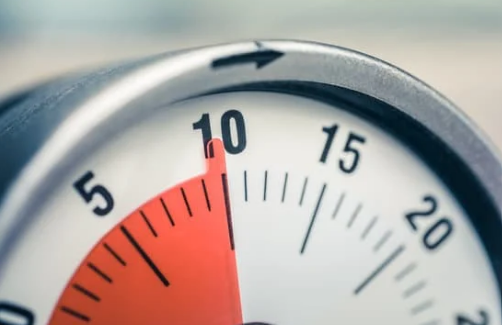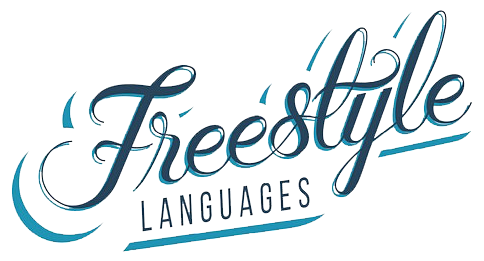Aug 16
/
Sarah Kempf, French Instructor
Learning a Language? 5 Fun Tips to Learn Vocabulary!
Learning science tells us that to incorporate a new word into your vocabulary (no matter the language) you must hear it/see it or use it at least 16-19 times. Sounds difficult? No es difícil! Team Freestyle has you covered with these five easy steps!
#1 Write it down
Studies show that you remember 40% more of what you write down. Writing is slower than typing so your brain has more time to analyze the words/sentences, increasing your chance to memorize it. PLUS, writing the words on the paper creates muscle memory. Build even more fluency by writing a sentence with the new word.
Studies show that you remember 40% more of what you write down. Writing is slower than typing so your brain has more time to analyze the words/sentences, increasing your chance to memorize it. PLUS, writing the words on the paper creates muscle memory. Build even more fluency by writing a sentence with the new word.


#2 Make it visual
Adding an image to your word list helps retain the vocabulary. For example, when learning the word “le poisson” in French you could draw or find a picture of a fish.
Simply visualizing the pictures works too! Linking an image to a word creates an association in your brain with already stored information, so you’ll remember it better. Think of it as getting a ‘discount’ on the work your brain has to do - half price!
Adding an image to your word list helps retain the vocabulary. For example, when learning the word “le poisson” in French you could draw or find a picture of a fish.
Simply visualizing the pictures works too! Linking an image to a word creates an association in your brain with already stored information, so you’ll remember it better. Think of it as getting a ‘discount’ on the work your brain has to do - half price!
#3 Say it out loud! (Yes, talk to yourself)
Repeat the words and sentences out loud. We mean it: OUT LOUD! By doing this you are creating a memorable experience for your brain while creating muscle memory with your mouth.
You may find it silly to talk to yourself, but you will remember the vocabulary better. Speaking, such a simple act - it’s how our human brain works with language.
Repeat the words and sentences out loud. We mean it: OUT LOUD! By doing this you are creating a memorable experience for your brain while creating muscle memory with your mouth.
You may find it silly to talk to yourself, but you will remember the vocabulary better. Speaking, such a simple act - it’s how our human brain works with language.

#4 Learn words in context
Simply memorizing lists of words does not make you proficient in a language. Watching movies or TV series or reading in the language you are learning is a fun way to learn new words - almost as much fun as music. (psst: see our Spotify lists -Choose your language: French, Spanish, English)
Bonus: you hear/see the example of the word in a real world scenario and not by itself. If you come across a new word, instead of looking it up right away, see if you can guess the meaning based on the context.
Simply memorizing lists of words does not make you proficient in a language. Watching movies or TV series or reading in the language you are learning is a fun way to learn new words - almost as much fun as music. (psst: see our Spotify lists -Choose your language: French, Spanish, English)
Bonus: you hear/see the example of the word in a real world scenario and not by itself. If you come across a new word, instead of looking it up right away, see if you can guess the meaning based on the context.
#5 Repetition is key (and Micro-lessons matter!)
Back to that 16-19 times. Repeating the words in spaced intervals helps you remember the words more easily as they make it into your long term memory. Spending short periods of time practicing is more beneficial to you in the long run. 5 to 10 minutes daily makes the vocabulary stick!
Back to that 16-19 times. Repeating the words in spaced intervals helps you remember the words more easily as they make it into your long term memory. Spending short periods of time practicing is more beneficial to you in the long run. 5 to 10 minutes daily makes the vocabulary stick!

Learning tip: If it looks like something you know, it IS something you know. Give yourself the benefit of the doubt. (English shares around 30% of words with Spanish and French.)
Ready to practice vocabulary and more in a fun context? Learn more about our self-paced learning options (with access to our conversation coaching!)
Want more resources to learn Spanish, or French? Click here!
Ready to practice vocabulary and more in a fun context? Learn more about our self-paced learning options (with access to our conversation coaching!)
Want more resources to learn Spanish, or French? Click here!
About the Author: Sarah Kempf
Sarah fell in love with French sitting in a high school classroom at the age of 14. Thanks to a passionate teacher and a class trip to Quebec City, Sarah continued her French studies. She spent her semester abroad studying in Montpellier as well as a summer in Avignon studying theater. She went on to earn a BA in French from Aquinas College in Michigan and an MA in French and Francophone Studies from the University of California Santa Barbara. She has more than 20 years of experience teaching French and enjoys making the language come alive for students.
Learn more.
Sarah fell in love with French sitting in a high school classroom at the age of 14. Thanks to a passionate teacher and a class trip to Quebec City, Sarah continued her French studies. She spent her semester abroad studying in Montpellier as well as a summer in Avignon studying theater. She went on to earn a BA in French from Aquinas College in Michigan and an MA in French and Francophone Studies from the University of California Santa Barbara. She has more than 20 years of experience teaching French and enjoys making the language come alive for students.
Learn more.
Freestyle Languages
Language learning your way.
